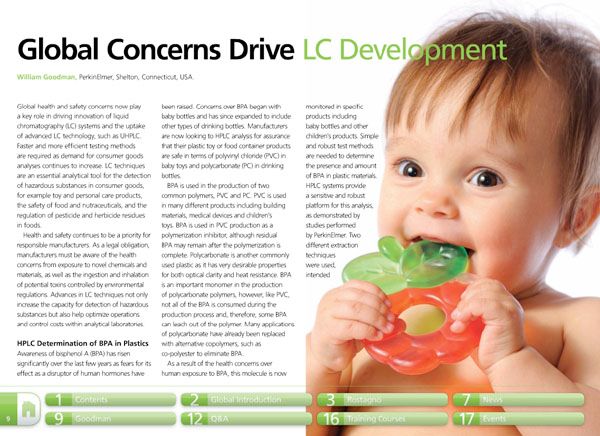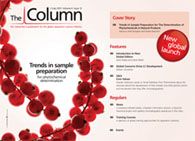Global Concerns Drive LC Development
Global health and safety concerns now play a key role in driving innovation of liquid chromatography systems and the uptake of advanced LC technology, such as UHPLC.
Global health and safety concerns now play a key role in driving innovation of liquid chromatography (LC) systems and the uptake of advanced LC technology, such as UHPLC. Faster and more efficient testing methods are required as demand for consumer goods analyses continues to increase. LC techniques are an essential analytical tool for the detection of hazardous substances in consumer goods, for example toy and personal care products, the safety of food and nutraceuticals, and the regulation of pesticide and herbicide residues in foods.
Health and safety continues to be a priority for responsible manufacturers. As a legal obligation, manufacturers must be aware of the health concerns from exposure to novel chemicals and materials, as well as the ingestion and inhalation of potential toxins controlled by environmental regulations. Advances in LC techniques not only increase the capacity for detection of hazardous substances but also help optimize operations and control costs within analytical laboratories.
New Method Explored for the Detection of CECs in Crops Irrigated with Contaminated Water
April 30th 2025This new study presents a validated QuEChERS–LC-MS/MS method for detecting eight persistent, mobile, and toxic substances in escarole, tomatoes, and tomato leaves irrigated with contaminated water.
University of Tasmania Researchers Explore Haloacetic Acid Determiniation in Water with capLC–MS
April 29th 2025Haloacetic acid detection has become important when analyzing drinking and swimming pool water. University of Tasmania researchers have begun applying capillary liquid chromatography as a means of detecting these substances.
Prioritizing Non-Target Screening in LC–HRMS Environmental Sample Analysis
April 28th 2025When analyzing samples using liquid chromatography–high-resolution mass spectrometry, there are various ways the processes can be improved. Researchers created new methods for prioritizing these strategies.

.png&w=3840&q=75)

.png&w=3840&q=75)



.png&w=3840&q=75)



.png&w=3840&q=75)












